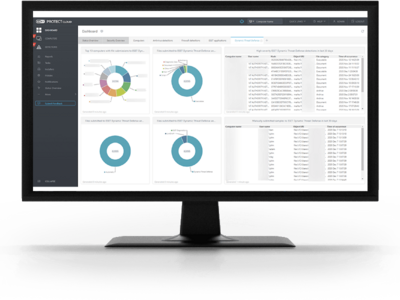File server security
ESET Server Security
Provides advanced protection for your company’s data passing through all general servers, network file storage including OneDrive, and multi-purpose servers to ensure business continuity.
- Ransomware prevention
- Zero-day threats detection
- Data breaches prevention
- Botnet protection
Explore features
Machine learning
All ESET products currently use machine learning in conjunction with all of our other defense layers and have done so since 1997. Specifically, machine learning is used in the form of consolidated output and neural networks.
Behavioural Detection - HIPS
ESET's Host-based Intrusion Prevention System (HIPS) monitors system activity and uses a pre-defined set of rules to recognise and stop suspicious system behaviour.
Ransomware Shield
An additional layer protecting users from ransomware. Our technology monitors and evaluates all executed applications based on their behavior and reputation. It is designed to detect and block processes that resemble the behaviour of ransomware.
Advanced Memory Scanner
ESET Advanced Memory Scanner monitors the behavior of a malicious process and scans it once it decloaks in memory. Fileless malware operates without needing persistent components in the file system that can be detected conventionally. Only memory scanning can successfully discover and stop such malicious attacks.
Network Attack Protection
ESET Network Attack Protection improves detection of known vulnerabilities on the network level. It constitutes another important layer of protection against spreading malware, network-conducted attacks, and exploitation of vulnerabilities, for which a patch has not yet been released or deployed.
Protection for Linux servers
ESET provides installers for the most popular distributions of Unix-based systems, including the ‘Ready’ variations of RedHat and SuSE that comply with the File-System-Hierarchy standard. It requires no external libraries except for LIBC.
Botnet Protection
ESET Botnet Protection detects malicious communication used by botnets, and at the same time, identifies the offending processes. Any detected malicious communication is blocked and reported to the user.
Office 365 OneDrive Storage
After registration is done on a single server, ESET has the ability to scan OneDrive to provide visibility and monitor the trusted source of company storage.
Optional Advanced Threat Defense
ESET LiveGuard Advanced provides another layer of security for ESET Server Security solutions by utilizing cloud-based sandboxing technology to detect new, never before seen type of threats.
AMSI/Protected Service Support
ESET products leverage the Antimalware Scan Interface (AMSI) to provide enhanced malware protection for users, data, applications, and workload. In addition, it utilizes the protected service interface that is a new security module built into Windows that only allows trusted, signed code to load and better protect against code injection attacks.
Exploit Blocker
ESET Exploit Blocker monitors typically exploitable applications (browsers, document readers, email clients, Flash, Java and more), and instead of just aiming at particular CVE identifiers, it focuses on exploitation techniques. When triggered, the threat is blocked immediately on the machine.
In-product Sandbox
ESET’s in-product Sandbox assists in identifying the real behavior hidden underneath the surface of obfuscated malware.
Support for XDR
ESET Security for Microsoft SharePoint supports ESET Inspect, the XDR-enabling component of the ESET PROTECT platform, for immediate analysis and remediation of network security issues.
System requirements
Supported Windows operating systems
- Microsoft Windows Server 2022, 2019, 2016, 2012, 2008 R2 SP1
- Microsoft Windows Server Core 2012, 2008R2
- Microsoft Small Business Server 2011
Included products
- ESET Server Security for Microsoft Windows Server
- ESET Server Security for Linux
Compatible with ESET PROTECT console.
Requirements for ESET Server Security for Linux
Supports the main distributions including RedHat Enterprise Linux (RHEL), CentOS, Ubuntu Server, Debian, SUSE Linux Enterprise Server, Amazon Linux and Oracle Linux.
For detailed requirements see this page.
